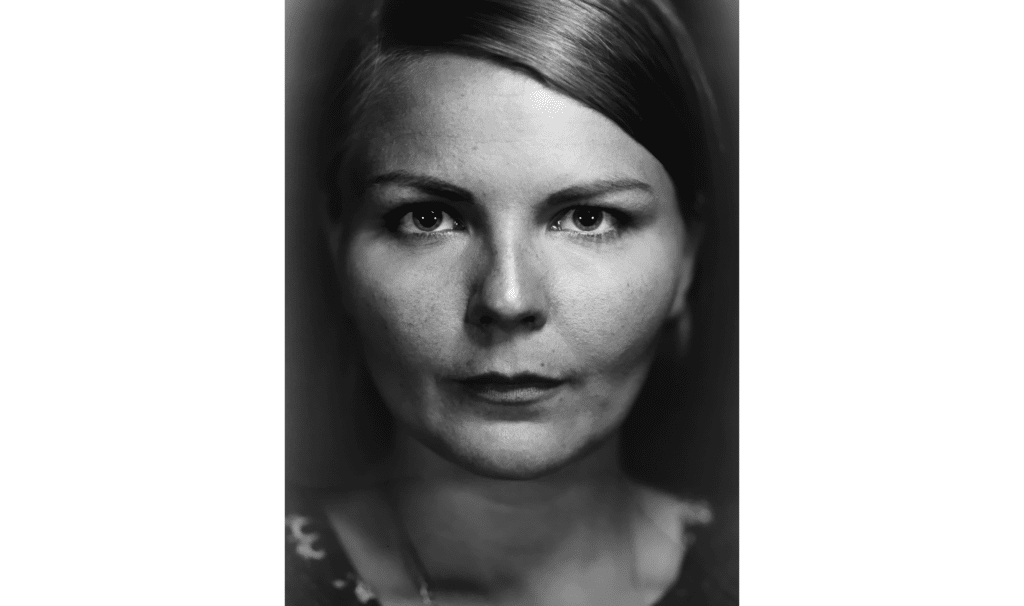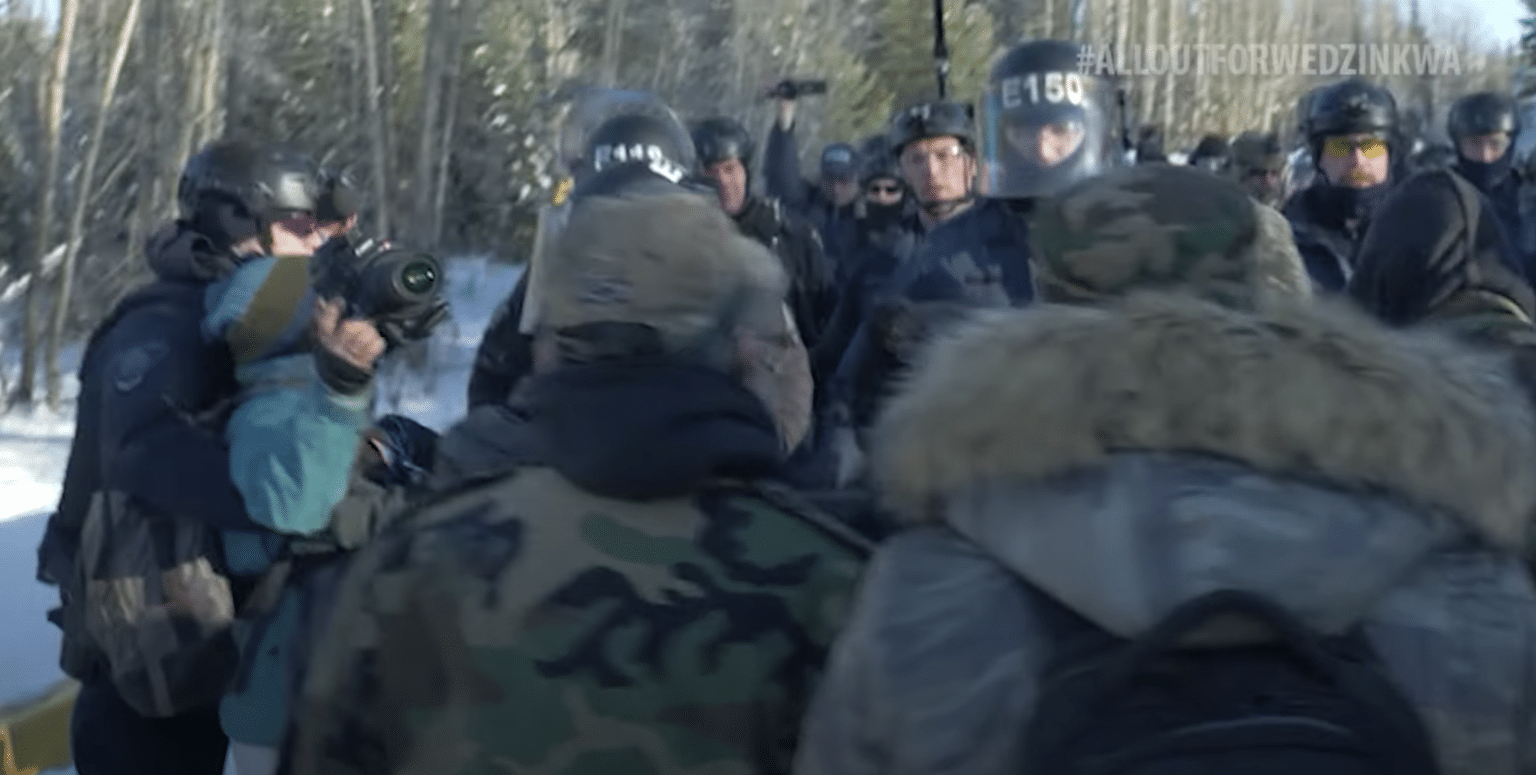Starting on November 18, Canada’s RCMP violently cracked down on a group of Indigenous land defenders who had sought to block the construction of a major natural gas pipeline in northern British Columbia, arresting roughly 15 people over a two-day period. The RCMP also detained two journalists covering the events.
The Coastal GasLink pipeline, under construction by TC Energy, will bring fracked natural gas from British Columbia to the Pacific Coast for export at a facility partly owned by oil giant Shell. The pipeline crosses unceded territory of the Wet’suwet’en, whose hereditary leaders never consented to the project.
The arrests of Amber Bracken, who was on assignment for The Narwhal, and Michael Toledano, a filmmaker who has been making a documentary for the past three years, were widely condemned by journalism and freedom of the press organizations.

Update 11/23/2021: On the evening of November 22, both Amber Bracken and Michael Toledano were released from custody. The Narwhal reports that the RCMP had been tracking and collecting information on both journalists in a national database prior to the raid. After his release, Toledano posted to Twitter, stating that one officer gloated at his arrest. In a statement, the RCMP claimed that the reporters did not identify themselves immediately. The RCMP official, Assistant Commissioner Eric Stubbs, said he “understands the important constitutional role the media play in Canada,” and going forward, “I remain available and willing to work with the media on ensuring there are clear communications, processes, and understanding for all those involved.”
Update 11/24/2021: After his release, Michael Toledano published footage of the raid that he recorded. The video shows RCMP breaking into a tiny house where Wet’suwet’en were sheltering. The officers used an ax, K-9 units, and pointed rifles at the people inside. The two journalists were inside documenting the situation, and the video depicts them identifying themselves as members of the press before RCMP arrested them. Democracy Now aired more footage recorded by Toledano which included the moment that he and Amber Bracken were arrested.
This video clip from @M_Tol shows 2 arrested journalists, Amber Bracken and Michael Toledano, who shot the video, VERY clearly identifying themselves to RCMP as journalists. The RCMP lied to media and said they did not. #bcpoli @caj @photobracken https://t.co/K2xqugmF1k
— Sarah Cox (@sarahcox_bc) November 24, 2021
“It’s completely and utterly shocking the extent to which the RCMP are going to prevent journalists from covering events that are happening in the public interest,” Brent Jolly, president of the Canadian Association of Journalists (CAJ) said in a statement.
For years, the Wet’suwet’en have been fighting the construction of the pipeline, but the project reached a critical moment in recent months, when Coastal GasLink (CGL) sought to drill underneath the Wedzin Kwa (Morice River), a pristine river in northern BC whose headwaters are sacred to the Wet’suwet’en.
In response, members of the Gidimt’en Clan of the Wet’suwet’en occupied the drill site in September to block access and interrupt the drilling plans, using the mantra “All out for Wedzin Kwa” to describe and promote their campaign.
On November 14, the Gidimt’en Clan enforced an eviction of CGL employees from their territory, occupying a forest road that cut the pipeline company off from the site.
“The Wet’suwet’en hereditary chiefs have never ceded, surrendered, or lost in war, title to this territory. That means that what they say goes,” said Sleydo’ Molly Wickham, a Gidimt’en Clan spokesperson who was among those arrested. In the eviction notice, the Gidimt’en Clan pointed to a 1997 Supreme Court of Canada ruling that affirmed that Aboriginal title has never been extinguished.
It was this move to evict CGL pipeline workers that prompted the forced intervention by RCMP days later.
On November 18, with BC still responding to the widespread damage from the recent “atmospheric river” event that flooded the interior part of the province and left 17,000 people displaced from their homes, the RCMP flew police into Smithers, a regional airport, from which they could launch an assault on the occupation near Wedzin Kwa.
It’s a remarkable backdrop. After several months of climate crises that have ravaged BC, militarized police were cracking down on Indigenous land defenders to ensure that the construction of a gas pipeline — which will worsen the climate crisis — remains on schedule.
Over the next 48 hours, RCMP conducted a raid, brandishing sniper rifles and using K-9 units, to break up the blockade. They arrested at least 15 people.
“The Wet’suwet’en people, under the governance of their hereditary Chiefs, are standing in the way of the largest fracking project in Canadian history. Our medicines, our berries, our food, the animals, our water, our culture, our homes are all here since time immemorial,” Sleydo’ Molly Wickham of the Wet’suwet’en said prior to her arrest. “We will never abandon our children to live in a world with no clean water. We uphold our ancestral responsibilities. There will be no pipelines on Wet’suwet’en territory.”
BREAKING PHOTOS – Dozens of heavily armed RCMP breaching @Gidimten checkpoint. There are 15 confirmed arrests, including two Wet'suwet'en elders, 3 Haudenosaunee, 3 legal observers and one journalist.
— Gidimt’en Checkpoint (@Gidimten) November 18, 2021
Coyote Camp continues to block CGL's drilling.
📷: Dan Loan#ShutDownCanada pic.twitter.com/k3YTBch0JX
In a statement on November 19, CGL said that the RCMP raid was “unfortunate,” but that it was needed to restore “lawful access.”
The arrest of two journalists also sparked outrage.
“Journalism is not a crime,” Emma Gilchrist, Editor-in-Chief of The Narwhal, said in a statement. “Amber’s arrest — along with the arrest of freelance filmmaker Michael Toledano — marks just the latest in a long string of illegal RCMP actions against journalists.”
The Narwhal and a coalition of other media outlets successfully led a legal challenge against the RCMP just a few months ago after police blocked media access to the protests of old-growth logging at the Fairy Creek blockade on Vancouver Island in July. The RCMP used heavy-handed tactics to break up the protest encampment. The BC Supreme Court ruled that the police’s attempt to restrict media access was unlawful.
“RCMP crackdown on journalists has reached a crescendo. In the last year, journalists have been impeded, targeted, and arrested by the authorities while covering some of the most critical stories in Canada,” Kiran Nazish, founder of the Coalition for Women in Journalism, said in a statement. “We are surprised that these violations continue. We highly condemn the arrest and charges against a respectable journalist like Amber Bracken, who has been diligently reporting on a story that affects the Canadian public. We see this arrest as a violation of freedom of press. We also see these violations against journalists as a breach of police responsibilities and demand the RCMP put a stop to this trend.”
Protests in solidarity with the Wet’suwet’en sprung up around Canada over the weekend.
At the time of this writing, after spending several days in jail, the people arrested at the Wet’suwet’en blockade were scheduled for release. But CGL is seeking conditions for their release, which include denying those arrested future access to large swathes of Wet’suwet’en territory except for certain cultural activities. The Gidimt’en Clan said the conditions would set a “dangerous precedent.”
CGL also wants the injunction applied to the two journalists.
.@photobracken has been released from jail — on the condition that she'll appear in court in February.
— The Narwhal (@thenarwhalca) November 22, 2021
The fight for press freedom in Canada continues. The RCMP must be held accountable for illegal actions against journalists. Take action: https://t.co/lIsTqCscxG
CGL is reportedly asking Sleydo’ Molly Wickham to “prove” that she is Wet’suwet’en, a condition that Jen Wickham, media coordinator for Gidimt’en Checkpoint, said is “completely racist and sexist.”
“Industry’s reliance on the racist and oppressive legal weapon of injunctions is a way to maintain the continued dispossession and criminalization of Indigenous peoples,” Grand Chief Stewart Phillip, President of the Union of BC Indian Chiefs, said in a statement. “By dragging us through court and using injunctions against us, our Indigenous rights are being violated and are given less consideration than climate-destroying corporations.”
He continued: “We are calling for the release of all Wet’suwet’en land defenders, and for BC and Canada to uphold Indigenous Title and Rights and institute a moratorium on fossil fuel expansion in the wake of clear and present climate catastrophe.”
Subscribe to our newsletter
Stay up to date with DeSmog news and alerts







